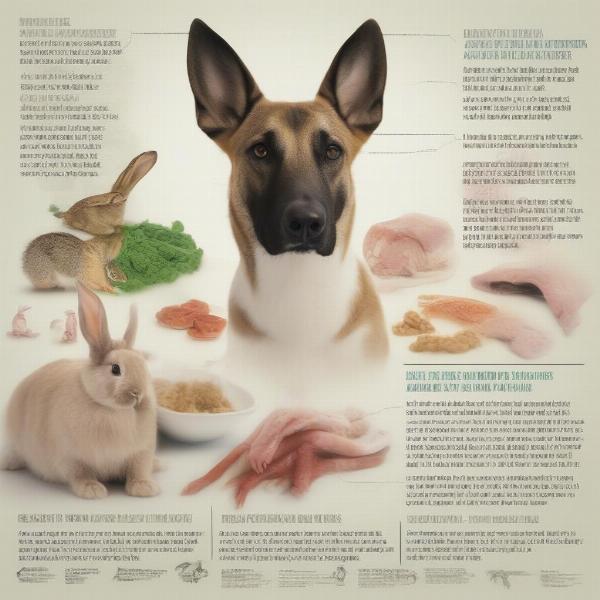My dog ate a rabbit. This is a fairly common occurrence, especially for dogs with a strong prey drive. While it’s natural behavior, it can be concerning for owners. This article addresses the potential risks, necessary actions, and how to prevent it from happening again. We’ll cover everything from potential health concerns to training tips, ensuring you’re equipped to handle this situation should it arise again.
Understanding the Risks of a Dog Eating a Rabbit
While a seemingly harmless act, there are several potential risks associated with a dog eating a rabbit. These range from relatively minor issues to serious health concerns. Understanding these risks will allow you to respond appropriately and protect your dog’s health.
Parasites and Diseases
Rabbits can carry various parasites, such as fleas, ticks, and internal parasites like tapeworms. These can be transmitted to your dog upon ingestion. Tularemia, a bacterial infection, is also a concern, as it can be fatal to dogs.
Digestive Upset
The rabbit’s fur and bones can cause digestive issues, ranging from mild upset stomach to serious blockages. Symptoms can include vomiting, diarrhea, constipation, and loss of appetite.
Toxic Substances
If the rabbit had ingested poison, your dog could be indirectly poisoned as well. This is particularly concerning in areas where pest control measures are common.
 Dog Eating Rabbit Risks
Dog Eating Rabbit Risks
What to Do if Your Dog Eats a Rabbit
If your dog ate a rabbit, it’s important to remain calm and take the following steps:
-
Observe your dog closely: Monitor for any unusual behavior or symptoms, such as vomiting, diarrhea, lethargy, or loss of appetite.
-
Contact your veterinarian: Inform them of the incident and describe any symptoms your dog is exhibiting. They will advise on the best course of action.
-
Follow your veterinarian’s instructions: This might include bringing your dog in for an examination, administering medication, or simply monitoring their condition.
-
Collect a sample: If possible, collect a sample of the rabbit’s remains for testing, especially if you suspect poisoning.
Preventing Your Dog from Eating Rabbits
While completely eliminating the prey drive is difficult, you can take steps to minimize the chances of your dog eating a rabbit again:
- Training: Reinforce “leave it” and “come” commands. costume hot dog can sometimes be a helpful distraction during training.
- Leash walking: Keep your dog on a leash when in areas where rabbits are present. A dog coursing machine can provide a safe outlet for their chasing instincts.
- Secure your yard: Fence your yard securely to prevent rabbits from entering and your dog from exiting unsupervised. Check our recommended bonnyton farm dog run for ideas.
- Provide enrichment: Keep your dog mentally and physically stimulated with toys, games, and exercise to reduce their focus on hunting. talking dog toys for dogs can be a great way to provide mental stimulation.
- Consider a muzzle: In extreme cases, a muzzle might be necessary to prevent your dog from consuming rabbits.
Conclusion
Finding out your dog ate a rabbit can be alarming. By understanding the potential risks and taking proactive steps, you can safeguard your dog’s health and minimize the chances of this happening again. Remember to always consult your veterinarian for advice specific to your dog’s situation. Consistent training and responsible pet ownership are key to preventing future incidents.
FAQ
- Is it normal for a dog to eat a rabbit? Yes, it’s instinctive behavior, especially for breeds with a strong prey drive.
- What diseases can my dog get from eating a rabbit? Tularemia, parasites like tapeworms, and other infections are possible.
- When should I contact my vet? If your dog shows any signs of illness, such as vomiting, diarrhea, or lethargy, contact your vet immediately.
- Can I prevent my dog from eating rabbits completely? While challenging, consistent training and management can significantly reduce the likelihood.
- What should I do if my dog ate a poisoned rabbit? Contact your vet immediately and provide as much information as possible.
- What is the best way to train my dog not to chase rabbits? Positive reinforcement training, focusing on “leave it” and “come” commands, is generally recommended.
- Are there any specific foods I should avoid feeding my dog if they have a tendency to eat rabbits? Consult with your vet to determine the best diet for your dog’s individual needs, considering the potential for exposure to parasites.
Expert Quote: “While a dog’s prey drive is natural, it’s crucial for owners to manage this instinct to protect both their dog’s health and the local wildlife,” says Dr. Emily Carter, DVM.
Expert Quote: “Early training and consistent reinforcement are key to preventing unwanted behaviors like chasing and consuming wild animals,” adds certified dog trainer, Mark Johnson.
ILM Dog is a leading international online resource dedicated to providing dog owners worldwide with reliable and practical information on all aspects of dog care and wellbeing. From breed selection to health, training, nutrition, grooming, and even traveling with your furry friend, ILM Dog is your one-stop shop for expert advice and valuable insights. Our expertise covers a wide range of topics including choosing the right breed, ensuring proper health and medical care, effective training and behavior modification techniques, nutritional guidance, grooming tips, and product recommendations. Contact us for personalized guidance at [email protected] or +44 20-3965-8624. Connect with us today and discover how ILM Dog can help you provide the best possible care for your canine companion!